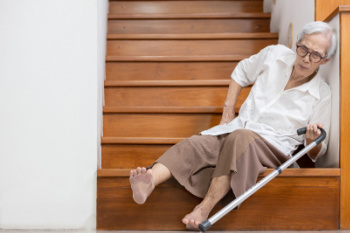
Falls can happen in an instant, often resulting from a trip on a rug or a slip on a wet floor. For older adults, these incidents can lead to serious medical complications. Every year, emergency rooms treat 3 million older individuals for fall-related injuries. Reports show that one out of five falls causes significant harm such as broken bones or head injuries. Age-related changes like reduced bone density, slower reaction times, and balance issues increase the likelihood of injury from falls. To reduce the risk, it is essential to safety-proof the home environment. Begin by ensuring that the bed height allows feet to rest flat on the floor. Use a bed cane for assistance and keep a walker nearby. Remove clutter from floors and stairs, clear pathways, and eliminate throw rugs. Install grab bars in bathrooms and railings on stairways for added support. Update lighting by replacing bulbs with brighter ones and adding nightlights in critical areas. Finally, check footwear to ensure that your shoes fit properly, are comfortable, and provide adequate support. A podiatrist can offer valuable advice on proper footwear and foot health to help prevent falls. If you are experiencing frequent falls at home, it is suggested that you make an appointment with a podiatrist for an exam and treatment options.
Preventing falls among the elderly is very important. If you are older and have fallen or fear that you are prone to falling, consult with Mohammad R. Parsa, DPM from Madison Foot Clinic. our doctor will assess your condition and provide you with quality advice and care.
Every 11 seconds, an elderly American is being treated in an emergency room for a fall related injury. Falls are the leading cause of head and hip injuries for those 65 and older. Due to decreases in strength, balance, senses, and lack of awareness, elderly persons are very susceptible to falling. Thankfully, there are a number of things older persons can do to prevent falls.
How to Prevent Falls
Some effective methods that older persons can do to prevent falls include:
- Enrolling in strength and balance exercise program to increase balance and strength
- Periodically having your sight and hearing checked
- Discuss any medications you have with a doctor to see if it increases the risk of falling
- Clearing the house of falling hazards and installing devices like grab bars and railings
- Utilizing a walker or cane
- Wearing shoes that provide good support and cushioning
- Talking to family members about falling and increasing awareness
Falling can be a traumatic and embarrassing experience for elderly persons; this can make them less willing to leave the house, and less willing to talk to someone about their fears of falling. Doing such things, however, will increase the likelihood of tripping or losing one’s balance. Knowing the causes of falling and how to prevent them is the best way to mitigate the risk of serious injury.
If you have any questions, please feel free to contact our office located in Madison, MS . We offer the newest diagnostic and treatment technologies for all your foot care needs.
